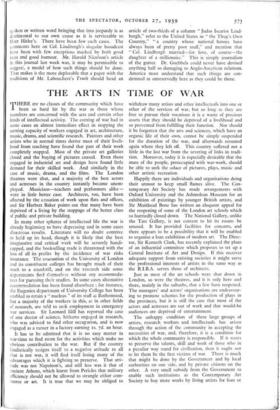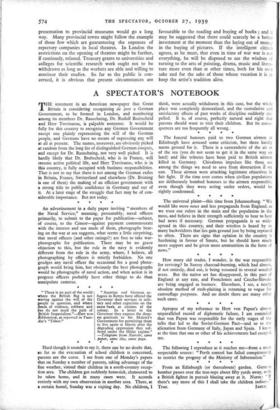THE ARTS IN TIME OF WAR T HERE are no classes
of the community which have -I- been so hard hit by the war as those whose members are concerned with the arts and certain other kinds of intellectual activity. The coming of war had in some cases an almost immediate effect in stopping the earning capacity of workers engaged in art, architecture, music, drama, and scientific research. Painters and other artists who in normal times derive most of their liveli- hood from teaching have found that part of their work completely stopped. Most of the private art galleries closed and the buying of pictures ceased. Even those engaged in industrial art and design have found little demand for their skilled work. And similarly in the case of music, drama, and the films. The London theatres were shut, and a majority of the best actors and actresses in the country instantly became unem- ployed. Musicians—teachers and performers alike-- were in little better case. Architects, too, have been affected by the cessation of work upon flats and offices, and Sir Herbert Baker points out that many have been deprived of a living by the stoppage of the better class of public and private building.
In many other spheres of intellectual life the war is already beginning to have depressing and in some cases disastrous results. Literature will no doubt contrive to hold up its head, though it is likely that the best imaginative and critical work will be severely handi- capped, and the bookselling trade is threatened with the loss of all its profits by the incidence of war risks insurance. The evacuation of the University of London and its constituent colleges has brought much of their work to a standstill, and on the research side some departments find themselves without any accommoda- tion for pursuing their studies. In some cases alternative accommodation has been found elsewhere ; for instance, the Eugenics department of University College has been enabled to retain a " nucleus " of its staff at Rothamsted, but a majority of the workers in this, as in other fields of research, are told to seek employment in emergency war services. Sir Leonard Hill has reported the case of one doctor of science, hitherto engaged in research, who was advised to find other occupation, and is now engaged as a turner in a factory earning Is. 7d. an hour.
It has to be admitted that it is no easy matter in war-time to find room for the activities which make no obvious contribution to the war. But if the country fatalistically resigns itself to a negative attitude to all that is not war, it will find itself losing many of the advantages which it is fighting to preserve. That atti- tude was not Napoleon's, and still less was it that of ancient Athens, which learnt from Pericles that military efficiency should not be allowed to strangle either com- merce or art. It is true that we may be obliged to withdraw many artists and other intellectuals into one or other of the services of war, but so long as they are free to pursue their vocations it is a waste of precious assets that they should be deprived of a livelihood and so prevented from fulfilling their function. Nor should it be forgotten that the arts and sciences, which have an organic life of their own, cannot be simply suspended for the duration of the war, and afterwards resumed again where they left off. This country suffered not a little in the last war from the severing of links in tradi- tion. Moreover, today it is especially desirable that the mass of the people, preoccupied with war-work, should be able to seek the solace of pictures, plays, music and other artistic recreation.
Happily there are individuals and organisations doing their utmost to keep small flames alive. The Con- temporary Art Society has made arrangements with Oxford University and the Ashmolean Museum for an exhibition of paintings by younger British artists, and Sir Muirhead Bone has written an eloquent appeal for the reopening of some of the London art schools which so hurriedly closed down. The National Gallery, unlike the Tate Gallery, is not content to let its rooms be unused. It has provided facilities for concerts, and there appears to be a possibility that it will be enabled to organise a loan exhibition of modern art. The Direc- tor, Sir Kenneth Clark, has recently explained the plans of an influential committee which proposes to set up a Central Institute of Art and Design. If this receives adequate support from existing societies it might serve the professional interests of artists in the same way as the R.I.B.A. serves those of architects.
Just as most of the art schools were shut down in London, so were the theatres, and it is only here and there, mainly in the suburbs, that a few have reopened. The managers' and actors' organisations are endeavour- ing to promote schemes for the production of plays in the provinces, but it is still the case that most of the actors and actresses are out of work and that would-be audiences are deprived of entertainment.
The unhappy condition of these large groups of artists, research workers and intellectuals has arisen through the action of the community in accepting the necessities of war, and, therefore, it is a condition for which the whole community is responsible. If it wants to preserve the talents, skill and work of those who in a peculiar way stand for civilisation, then it ought not to let them be the first victims of war. There is much that might be done by the Government and by local authorities on one side, and by private citizens on the other. A very small subsidy from the Government to enable such institutions as the Contemporary Art Society to buy more works by living artists for loan or presentation to provincial museums would go a long way. Many provincial towns might follow the example of those few which are guaranteeing the expenses of repertory companies in local theatres. In London the restrictions on the opening of theatres might be further, if cautiously, relaxed. Treasury grants to universities and colleges for scientific research work ought not to be withdrawn as long as the workers are able and willing to continue their studies. So far as the public is con- cerned, it is obvious that present circumstances are favourable to the reading and buying of books ; and it may be suggested that there could scarcely be a better investment at the moment than the laying out of mone in the buying of pictures. If the intelligent citizen agrees, as he must, that even in time of war war is nkit everything, he will be disposed to see the wisdom of turning to the arts of painting, drama, music and litera- ture more even than at other times, both for his ov a sake and for the sake of those whose vocation it is to keep the artist's tradition alive.









































 Previous page
Previous page